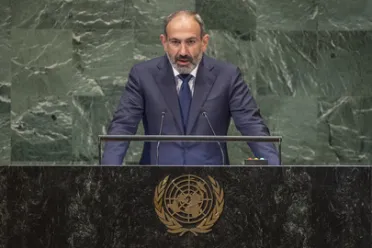Statement
Statement summary
NIKOL PASHINYAN, Prime Minister of Armenia, first took a moment to share the story of victory over the authoritarian rule during his country’s “Velvet Revolution”. The people of Armenia succeeded in an unprecedented revolution, without any violence. This was not a coincidence, he noted, and said: “Our intention was to make a revolution of love and solidarity. From the very beginning we declared that we ruled out any violence,” he said. “Our response would be with raised and open hands, smiles and love.”
He noted that when starting out the political process, there were only dozens marching from the second biggest city, Gyomri, to the capital Yerevan. Upon reaching Yerevan and showing determination and devotion to non-violence, the entire nation rose against the ruling regime, winning without a single victim or gunshot, only through peaceful demonstrations.
“Against all odds, I was elected Prime Minister,” he said, adding that it was possible because people were firm in their demand that the Parliament had to follow the people’s will. He said that today, however, that Parliament does not represent our people’s will as it was elected through massive vote buying and oppression.
“Free, fair and transparent elections will become an irreversible reality in Armenia,” he said. He noted the establishment of a new governance system, which is named people’s direct rule, something that will be institutionalized through elections, referendums and engagement of people in the decision-making process.
Despite the radical transformations in internal political life, the foreign policy agenda does not have U-turns, he continued. Armenia stands ready to have constructive dialogue with all partners. He noted the Armenian community in Syria that faces an existential threat from the ongoing crisis, and that his country has contributed humanitarian assistance.
The peaceful resolution of the Nagorno-Karabakh conflict continues to prevail, and the status of the Republic of Artsakh is a priority, he said. He noted that Armenia will continue constructive engagement in a peaceful resolution. Summing up, he noted that the conflict can be settled through mutual compromises by all sides.
Full statement
Read the full statement, in PDF format.
Photo

Previous sessions
Access the statements from previous sessions.
